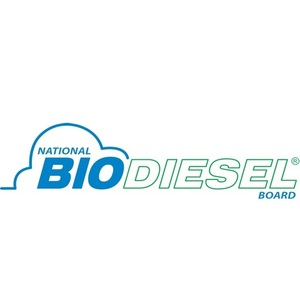Truck used in B100 pilot to be showcased at Farm Progress Show

August 30, 2021
BY National Biodiesel Board
One of the five trucks used in last year’s cooperative B100 pilot program will be on display at the 2021 Farm Progress Show in Decatur, Illinois. The pilot, conducted by ADM, the Illinois Soybean Association, Optimus Technologies, American Lung Association, National Biodiesel Board and Missouri Soybean Merchandising Council was designed to demonstrate the feasibility of commercial implementation of Optimus Technologies’ Vector System, which enables conventional diesel vehicles to operate on 100 percent biodiesel (B100). Five of ADM’s Class 8 over-the-road trucks, equipped with The Vector System, were used in daily fleet operations. These vehicles successfully traveled hundreds of thousands of miles on B100, even in the coldest temperatures of a central Illinois and Missouri winter.
“We’re all looking for ways to enhance the sustainability of our transportation system, and last year’s pilot program was an important step in proving the viability of significantly wider use of low-carbon biodiesel in truck fleets,” said Scott Fenwick, NBB technical director. “We’re collecting and analyzing the data from the past year and look forward to discussing the details soon. That said, one thing that was clear is that the five trucks in the program worked well in a variety of conditions, including record-low temperatures over the winter. We’re excited by the opportunity, and proud to display one of the trucks used in this pilot at the 2021 Farm Progress Show.”
The cab will be displayed outside ADM's exhibit at the corner of Seventh Progress Street and Central Progress Avenue.
Advertisement
B100 is a readily available, high-performance solution for lowering carbon and tailpipe emissions from diesel vehicles. A groundbreaking study conducted by Trinity Consultants and sponsored by the NBB reaffirmed decades of studies showing that biodiesel burns significantly cleaner and reduces carbon emissions by 74 percent on average compared to petroleum diesel fuel. The study focused on a shift to B100 for transportation and home heating in 13 communities on the East Coast, West Coast and Colorado. The study found that a switch to B100 would result in a variety of health benefits, including a 45 percent reduction in cancer risk amongst the transportation sector and an 86 percent reduced cancer risk in the heating oil sector in communities where B100 was used in place of petroleum diesel fuel and heating oil respectively.
The implementation of Optimus Technologies’ Vector System in ADM’s fleet is a significant advancement toward a cleaner environment and garnering the benefits that have been observed in the Trinity Consultants study. The successful pilot also proves the viability of implementing low-carbon, renewable biodiesel as a high-performance and clean-burning alternative that is known to offer superior cetane and lubricity when compared to petroleum diesel fuel.
Advertisement
“Although the ADM pilot program utilized aftermarket technology to use B100 throughout the winter, it’s important to realize that any unmodified diesel vehicle can use up to B20 during cold weather,” said Pete Probst, biodiesel specialist with the Illinois Soybean Association. “In fact, B20 blends have been used successfully all year-round even in the coldest climates in the US by simply following best practices for any fueling operation. Removing excess moisture from storage tanks and properly blending fuels with recommended cold flow additives before cold weather sets in will help ensure a problem-free winter.”
More information from ISA on biodiesel can be found in booth #605 at the Farm Progress Show.
Related Stories
The Michigan Advanced Biofuels Coalition and Green Marine are partnering to accelerating adoption of sustainable biofuels to improve air quality and reduce GHG emissions in Michigan and across the Great Lakes and St. Lawrence Seaway.
EIA reduces production forecasts for biobased diesel, increases forecast for other fuels, including SAF
The U.S. Energy Information Administration reduced its 2025 forecasts for renewable diesel and biodiesel in its latest Short-Term Energy Outlook, released April 10. The outlook for “other biofuel” production, which includes SAF, was raised.
FutureFuel Corp. on March 26 announced the restart of its 59 MMgy biodiesel plant in Batesville, Arkansas. The company’s annual report, released April 4, indicates biodiesel production was down 24% last year when compared to 2023.
Neste has started producing SAF at its renewable products refinery in Rotterdam. The refinery has been modified to enable Neste to produce up to 500,000 tons of SAF per year. Neste’s global SAF production capacity is now 1.5 million tons.
Tidewater expects to make final investment decision on proposed SAF project during second half of 2025
Tidewater Renewables Ltd. has reported that its biorefinery in Prince George, British Columbia, operated at 88% capacity last year. A final investment decision on the company’s proposed SAF project is expected by year end.
Upcoming Events










